Lessons the US Can Gain from Australia’s Social Media Restrictions for Children

Good intentions can lead us down the road to a surveillance state — a path many are starting to recognize.
Following a significant defeat in the US Court of Appeals for the District of Columbia last week, TikTok is on the verge of facing an outright ban in the United States.
If TikTok, owned by a Chinese company, cannot secure political support from the incoming Trump administration by January 19 (or establish new domestic ownership), the endless scrolling and viral antics that its 170 million American users enjoy may soon disappear.
While some view the actions of the Biden administration as governmental overreach, many American parents are eagerly looking for measures to restrict social media access for their children.
The detrimental impacts of exploitative algorithms on youth are now as undeniable as the established link between smoking and lung cancer.
Last year, the US Surgeon General cautioned that young individuals who spend “more than 3 hours per day on social media face double the risk of poor mental health outcomes, including symptoms of depression and anxiety.”
Nonetheless, safeguarding our children from the influences of Silicon Valley (and China) is more complex than simply banning harmful apps, as illustrated by ongoing developments in Australia.
Recently, Australia passed pioneering legislation to completely ban social media for users under the age of 16.
The new regulations will take aim at TikTok, Facebook, Snapchat, Reddit, X, and Instagram, imposing fines of up to $50 million AUD (around $33 million) on these companies for failing to keep minors away from their content.
Parents have welcomed this law, with surveys revealing that 77% of Australians support the government’s new measures. While I theoretically agree, I know firsthand the complexities involved. Having immigrated to Australia from the US in 2022 and now raising an Australian child, my wife and I have been contemplating our family’s approach to “screen time” from the very beginning — a world without scrolling seems much more appealing.
Unfortunately, Australia’s earnest (or perhaps politically motivated) attempts to appeal to concerned parents like me are fraught with challenges. The situation will likely be similar in the US.
As Lisa Given, a scholar in information studies at the Royal Melbourne Institute of Technology, puts it, “Many parents are feeling lost. They perceive [the ban] as the government taking action, but the fundamental question is, ‘How will this actually be enforced?’”
As it stands, the specifics of how Australia’s ban will be implemented remain unclear. It has been proposed that users may be required to log on with some form of government-issued ID such as a driver’s license (though the government has indicated this won’t be a requirement).
Alternatively, social media platforms could employ facial recognition or biometrics to verify user ages, even though initial findings suggest this method is less effective for non-Caucasian children.
Another potential method is “pattern recognition,” which involves monitoring a user’s internet behavior to infer their age. This would entail extensive internet surveillance and raise significant privacy concerns akin to those in China.
Given states, “If the goal is to protect children from harm, I don’t think this will work. There will always be kids who find ways around restrictions, whether using VPNs or accessing accounts on shared devices.” Instead of bans, we must focus on addressing issues like image-based abuse and the algorithms driving harmful content.
As with so many attempts to impose restrictions, where there’s a will, there’s a way: teens continue to vape, sneak alcohol, and find humor online, regardless of regulations.
It’s hard to dismiss the notion that this ban may also serve as a cover for monitoring and censoring online activities across Australia. Even if that’s not the intention, the legislation raises significant concerns about government overreach into private lives.
Moreover, there is a more effective approach available: tech companies have the capability to alter their algorithms to prevent the proliferation of damaging content among users.
However, without pressure from governments, particularly the US government, to do so, nothing will change.
Ultimately, it’s a scenario where profit may continue to triumph over public good. Apologies, Australia; it seems the dingo indeed got your baby.



